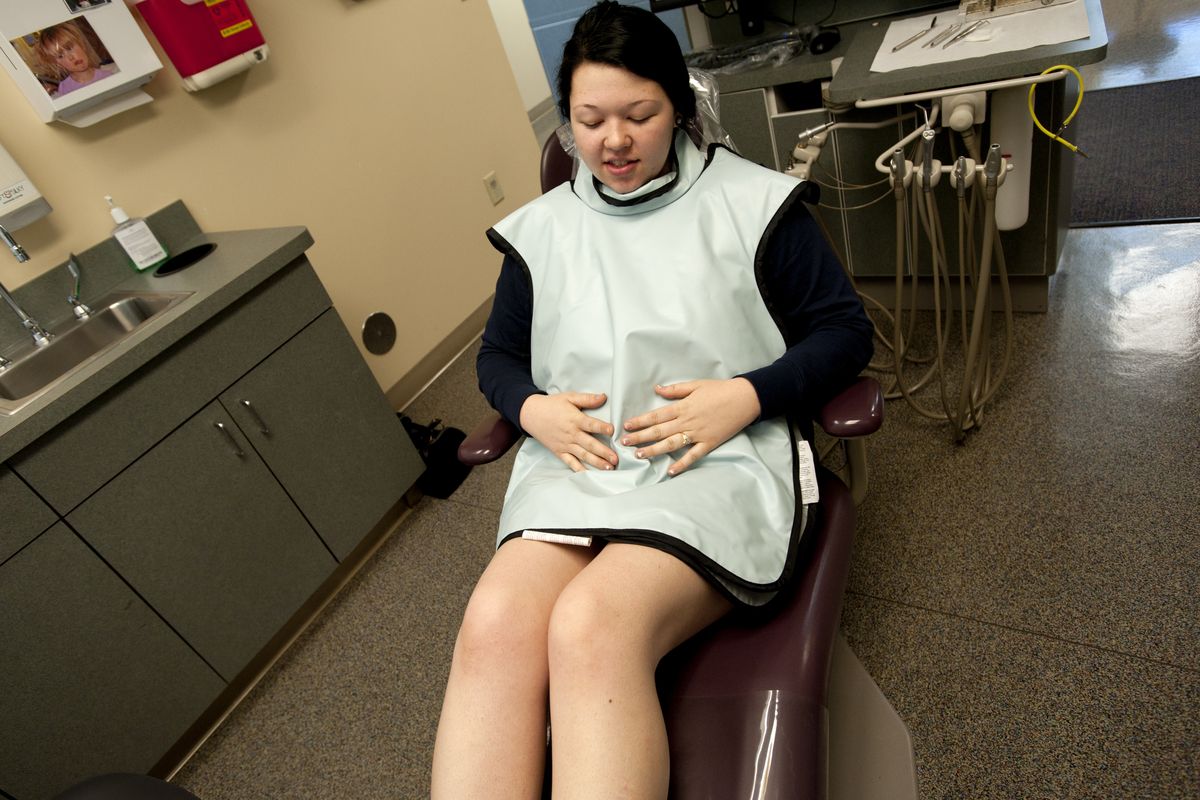Reason to smile
For pregnant women, Medicaid’s dental coverage can be great … while it lasts

Ashley Leon, 20, hadn’t seen a dentist for a couple of years before last week. She probably wouldn’t have seen one last week, either, if she weren’t pregnant, she said.
“I probably wouldn’t have had as much incentive to go, especially now that I know it affects the baby,” said Leon, who said her OB-GYN encouraged her to visit a dentist because of the links between pregnant women’s oral health and the health of their babies. “I was a little more concerned about the baby’s health than mine.”
Nor would Leon have had insurance to pay for it. After learning she was pregnant, she enrolled in a state Medicaid plan for low-income adults. And in Washington, pregnant women are among few groups of adults whose comprehensive dental care is covered by Medicaid.
At the start of 2011, the state stopped providing Medicaid coverage of all dental care for adults except for emergencies. About 16,000 pregnant women statewide were among those affected. But in September, the state notified Medicaid clients it was restoring preventive dental coverage for pregnant women, along with some elderly people and some people with developmental disabilities.
“It has come and gone and come and gone,” said Jessica Pearson, dental department supervisor at Riverstone Family Health Clinic in northeast Spokane, which serves Medicaid clients and other low-income patients.
The changes have been confusing for patients and for those who treat them, agreed Melissa Haidu, dental director for CHAS, which also treats low-income patients. And they’ve left many pregnant women unaware that their Medicaid coverage includes visits to the dentist, Haidu said.
Essentially, the current system creates a nearly yearlong window of opportunity for women – they’re eligible during their pregnancies plus two months after their babies are born – who couldn’t otherwise afford regular dental care. After that period, women on Medicaid return to regular-adult status: emergencies only.
Typical adults on Medicaid get the “bare minimum” of dental coverage, Pearson said. If they’re in pain with an infected tooth, Medicaid will cover extraction (although not to save the tooth).
Pregnant women, on the other hand, can get deep cleanings – removing debris and bacteria that might have built up over years without care – along with exams with X-rays, fillings and invasive procedures such as root canals.
“The coverage right now for pregnant women is actually really good,” Pearson said.
For many women in Spokane County, that could make a big difference. According to a 2010 report released by the Spokane Regional Health District, about 56 percent of women reported they visited the dentist while they were pregnant.
Also according to the health district’s 2010 report, 76 percent of clients of a program called First Steps said it had been more than a year since they’d had their teeth cleaned. More than 63 percent said it had been more than a year since they’d been to a dental office or clinic for any reason. First Steps, run by the Department of Social and Health Services, directs low-income pregnant women toward health and social services.
By the time pregnant women on Medicaid end up in her dentist’s chair, the lack of care is apparent, Haidu said. Many are suffering from some degree of tooth decay or infection.
“When we see them, they are usually very in need of help,” she said.
So those who provide care for low-income women are trying to take advantage of that window of opportunity, spreading the word through obstetricians, pediatricians and others that pregnant women can get dental care.
They’re also trying to encourage the women to make going to the dentist a habit. Even after they lose Medicaid coverage after delivering their babies, some may be able to pay sliding-scale fees or use long-term payment plans offered by clinics that serve low-income patients, including CHAS and Riverstone. Eastern Washington University’s Dental Hygiene Clinic also offers care at lower rates than private offices.
“During the time we see them, we really try to encourage the preventive aspect,” Pearson said.
For patient advocates who pressured the Legislature to make the exemption, it was difficult to choose one category of patients over another, said Steven Wish, director of public policy for the Washington Association of Community & Migrant Health Centers. The Olympia-based group was among those that lobbied the Legislature to restore care for pregnant women.
“The concern had to do with the fact that absent good dental care for pregnant women, there’s a good chance there could be transmission of disease to the child, to the baby,” Wish said.
As for Leon, the dental staff at the CHAS clinic on Maple Street found four small cavities and checked out her painfully emerging wisdom teeth. They set her next appointment for July, when they’ll start to take care of those little cavities before they become big ones, she said.
They’ll probably decide what to do with the wisdom teeth after her baby is born, she said – but before she loses her coverage.
Pearson said Medicaid for adults in general is a constant worry for her as the state grapples with its budget. She’s not confident dental care for pregnant women will be covered in the future.
“They’ve taken it away before. They can definitely take it away again,” Pearson said. “I don’t necessarily know what’s stopping them.”